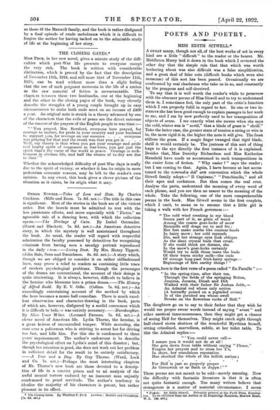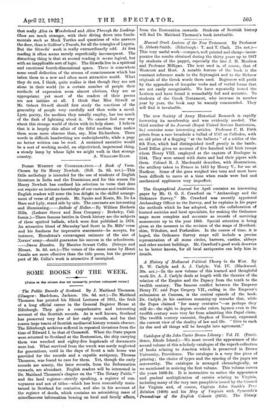POETS AND POETRY.
MISS EDITH SITWELL.*
A GREAT many, though not all, of the best works of art in every
kind are a little " difficult " to the reader or the hearer. Mr. Middleton Murry laid it down in the book which I reviewed the
other day that the simple rule that that which was worth bothering about was also difficult was a false simplification. and a great deal of false coin (difficult books which were also
nonsense) of this sort has been passed. Occasionally we are confronted by real charlatans who take us in so, and constantly by the pompous and self-deceived.
To say that it is well worth the reader's while to persevere with the obscurer poems of Miss Sitwell and to try to understand them is, I sometimes feel, the only part of the critic's function which I can properly fulfil in regard to her. In' one or two in- stances she has been good enough to explain passages in her work to me, and I am by now perfectly used to her transposition of objects of sense. I see exactly what she means when she says the cold, winter sun is " acrid," that a blade of grass is " shrill." Take the latter case, the greater state of tension a string or wire is in, the more rigid it is, the higher the note it will give. The frost stiffens the grass. If a magic finger twanged that rigid blade, shrill it would certainly be. The justness of this sort of thing leaps to the eye directly the first instance of it is explained.
Besides that, Miss Dorothy Richardson and Miss Katherine Mansfield have made us accustomed to such transpositions in the easier form of fiction. " Why easier ? " says the reader ; but I MI coming to that. Again, I have become at last accus- tomed to the commedia deli' arts convention which the whole Sitwell family adopt—" Il Capitano," " Punchinello," and all
their apes and cockatoos. But then comes the real crux. Analyse the parts, understand the meaning of every word of each phrase, and you are then no nearer to the meaning of the whole. Take the following, one of the most comprehensible poems in the book. Miss Sitwell seems in the first couplets, which I omit, to mean us to assume that a little girl is taking a walk with her French governess:
" The cold wind creaking in my blood Seems part of it, as grain of wood. Among the coarse goat-locks of snow Mamzelle still drags me to and fro ; Her feet make marks like centaur-hoofs In hairy snow ; her cold reproofs Die, and her strange eyes look oblique As the slant crystal buds that creak. If she could think me distant, she In the snow's goat-locks certainly Would try to milk those teats the buds Of their warm sticky milk—the cuds Of strange long-past fruit-hairy springs— Beginnings of first earthy things ! "
Or again, here is the first verse of a poem called " En Famine " :-
" In the spring-time, after their tea,
Through the fields of the springing Bohea, Jemima, Jocasta, Dinah and Deb
Walked with their father Sir Joshua Jebb,—
An Admiral red whose only notion
(A butterfly poised on a pigtailed ocean) IS of the peruked sea whose swell Breaks on the flowerless rocks of Hell."
The daughters go on to say to their father that they wish he would use proper swear words instead of saying " avast " and other nautical innocuousnesses, then they might get a chance of seeing Hell for themselves. They might catch sight through half-closed siesta shutters of the wonderful Myrrhina herself, sitting crinolined, marvellous, subtle, at her toilet table. To this the Admiral replies :-
" ' You could never call— I assure you it would not do at all !
She gets down from table without saying " Please," Forgets her prayers and to cross her T's, In short, her scandalous reputation Has shocked the whole of the hellish nation ; • For Hell is just as properly proper As Greenwich or as Bath or Joppa !
These poems are not meant to be odd—merely amusing. Now the difficulty with fantastic literature is that it is often. not quite fantastic enough. Too many writers believe that strangeness is a matter of material circumstance. I mean • Faeade. By Edith Sitwell. Privately printed at the Pavil Press, Kensin- ton. To be obtained from the Author at 22 rombrIdge Mansions, Moscow g
W. 2. [as. net.]
that really Alice in Wonderland and Alice Through the Looking- Glaes are much stranger, with their diving down into funda- mentals such as Mock Turtles and questions of who answers the door, than is Gulliver's Travels, for all the triangles of Laputa. But the Sitwells' work is really extraordinarily odd. At first reading it often seems merely superficially inconsequent. The disturbing thing is that at second reading it seems logical, but with an inapplicable sort of logic. The Sitwells live in a spiritual and emotional fourth-dimensional space. There is somewhere some small deflection of the stream of consciousness which has taken them to a now and often most attractive world. What they do not, I think, quite realize is that though they are not alone in their world (to a certain number of people their methods of expression seem almost obvious, they are so appropriate) yet most of the readers of their poems are not initiate at all. I think that Miss- Sitwell or Mr. Osbert Sitwell should first study the reactions of the generality of people very carefully and then write a novel. Lyric poetry, the medium they usually employ, has too much of the flash of lightning about it. We cannot find our way about this strange world of theirs with its help alone. I believe that it is largely this affair of the fitful medium that makes them seem more obscure than, say, Miss Richardson. Three words in difficult handwriting are undecipherable, while a page no better written can be read. A sustained narrative would be a sort of working model, an objectivized, impersonal thing, a-steady lamp by whose light we might walk in that strange



































 Previous page
Previous page